Ionic Propulsion, Traceable Textiles and Space Mission Design Innovations Top Embry-Riddle Entrepreneurship Competition
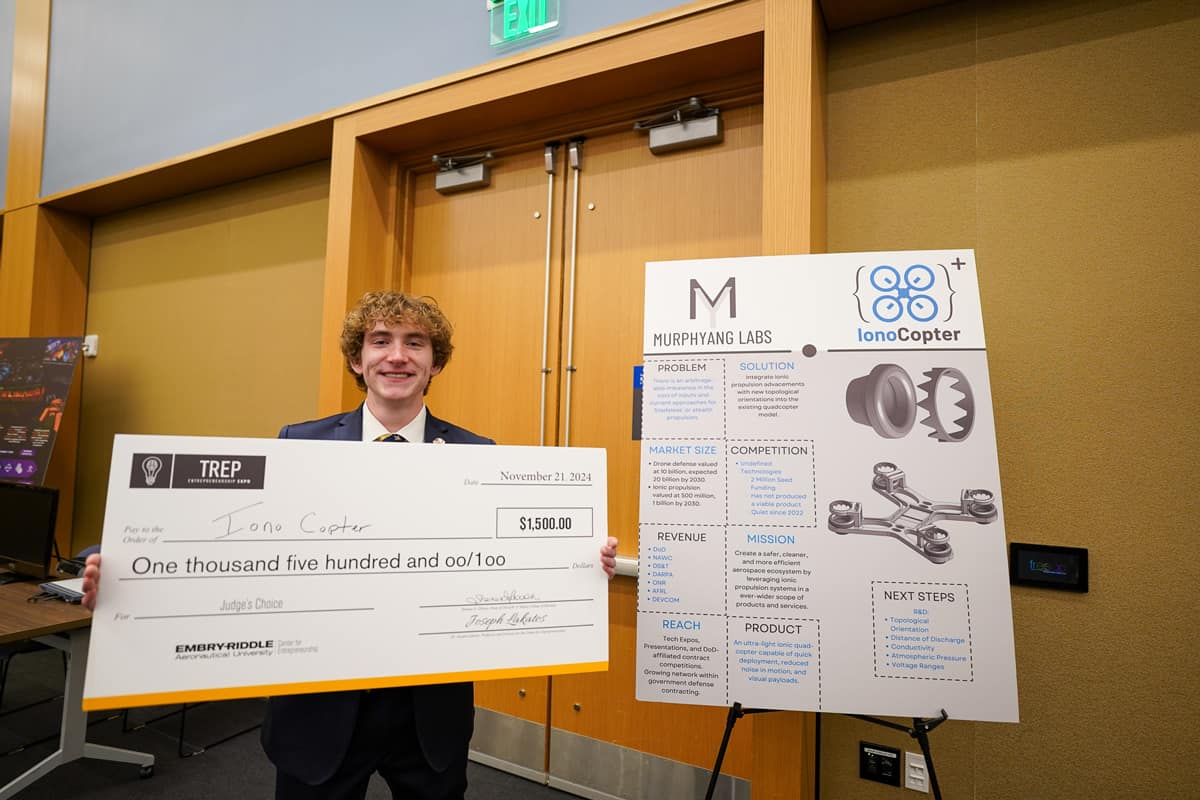
From quadcopter propulsion advancements to traceable textiles and space mission design tools, Embry‑Riddle Aeronautical University’s tenth annual TREP Expo highlighted the innovative spirit of the university community.
The annual business competition challenges teams to create venture concepts and pitch them before a panel of industry experts, practitioners and scholars. Each team is assessed according to three criteria — commercial viability, innovativeness and general interest — for a chance to earn cash funding for their ideas.
Open to students, alumni, faculty and staff, this year’s competition, which was held on Nov. 21 on the Daytona Beach Campus, brought together 26 venture teams.
“The TREP Expo was an incredible experience,” said Jacob Fleming, a Business Administration student who pitched his venture’s healthy energy food product, Slap Strips.
“We were gifted with so much knowledge from the judges and received tons of feedback on our product, as well as ideas for a way forward,” he said. “They say practice makes perfect, and we definitely got a lot of practice from the expo.”
This year’s event included two tracks. The Acceleration Track included concepts later in the development phase, with some teams presenting prototypes. The Incubation Track included ventures in the conceptual phase, including those created in entrepreneurship classes.
The expo also awarded one People’s Choice prize to the team with the most audience votes.
“The TREP Expo was a shining example of the power of experiential learning,” said Dr. Joseph Lakatos, interim director of the Center for Innovation and Entrepreneurship (CIE) and professor in the Department of Accounting, Economics, Finance & Information Sciences.
“The best part of the expo was witnessing engineers, for example, develop a business mindset, while business students gained a deeper appreciation for aerospace and aviation. I am also very proud of my team of students in the CIE who made this a success. They worked very hard,” he said.
First Place in the Acceleration Track: IonoCopter ($1,500)
For first-year student Andrew Murphy, winning the Acceleration track came as a shock.
“I started this project three months ago, and I didn’t think I would get this far,” Murphy said. He has big goals for expanding his venture, including a dream of one day having an office at the Research Park’s MicaPlex.
Dubbed the IonoCopter, Murphy’s patent-pending design pairs a quadcopter — or a drone with four rotors — with an ionic propulsion system. Such systems utilize an electrical charge to accelerate ionized molecules that interact within a discharge cone, in turn creating thrust.
Murphy, who plans to major in Aerospace Engineering, describes the outcome as a quadcopter that is “a lot quieter than a traditional drone,” especially because his model contains no moving parts.
To build on his TREP Expo win, Murphy plans to conduct research and development around the best spatial orientation for his quadcopter. He also plans to investigate performance elements of its propulsion, including voltage range and discharge distance.
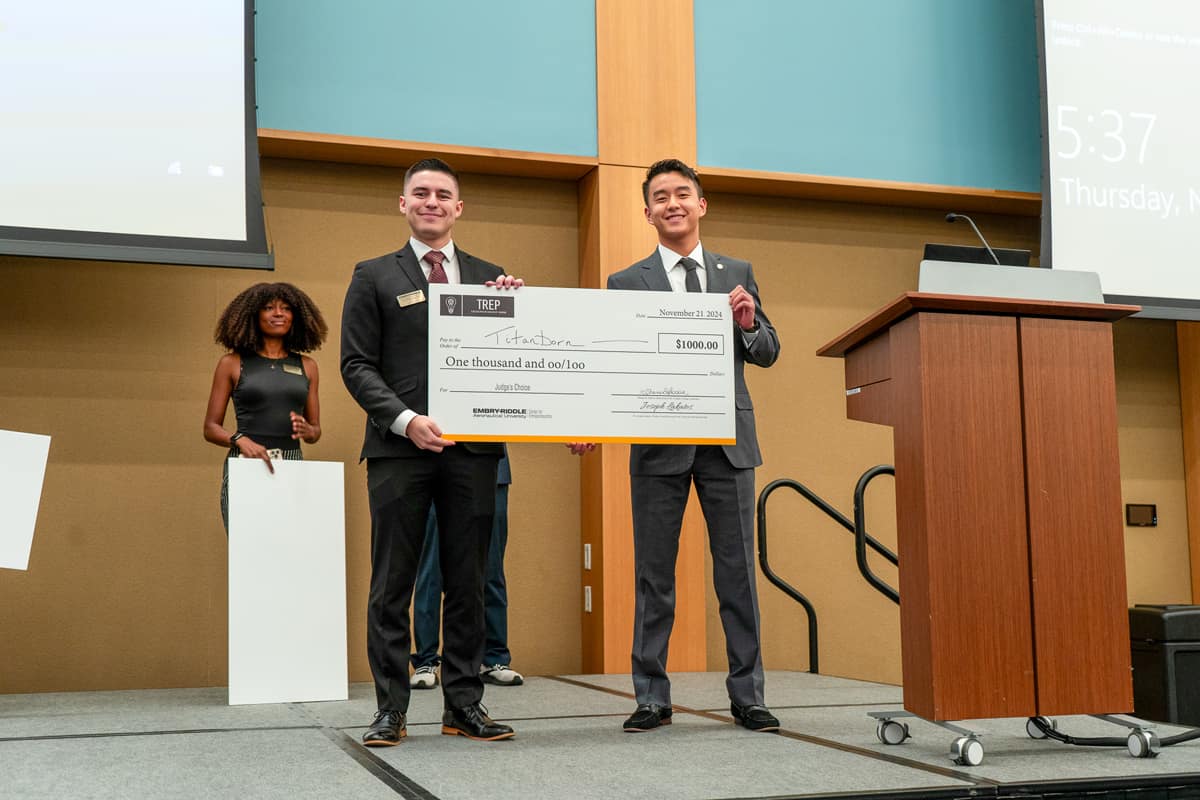
Titanborn, represented by undergraduate student Lucas Cohen (left), won second place in the Acceleration Track. (Photo: Embry‑Riddle/Ariana Grasso)
Second Place in the Acceleration Track: Titanborn ($1,000)
Titanborn — developed by Beyond Bounds Studios through the collective effort of 23 volunteers over a six-year period — is set on revolutionizing the experience of MMORPG, short for mass multiplayer online role-playing games. MMORPGs can be expensive to purchase and often have hardware requirements that further limit accessibility.
Beyond Bounds Studios aims to address these challenges with Titanborn, which will soon launch an open beta featuring the first-ever fully voice-acted and animated Minecraft gaming experience.
“I started Titanborn six years ago as a passion project during high school,” said Lucas Cohen, an Aerospace Engineering major. “Since then, it has evolved into a business opportunity through Beyond Bounds Studios, my planned video game development company."
The team’s space-fantasy MMORPG is free to play with a Minecraft account and has already built a community of more than 900 early supporters, amassing 30,000 views across six YouTube channels.
Expo funding will enable Beyond Bounds Studios to file as a limited liability company and improve their hardware infrastructure — key to delivering the immersive experience at the heart of their vision.
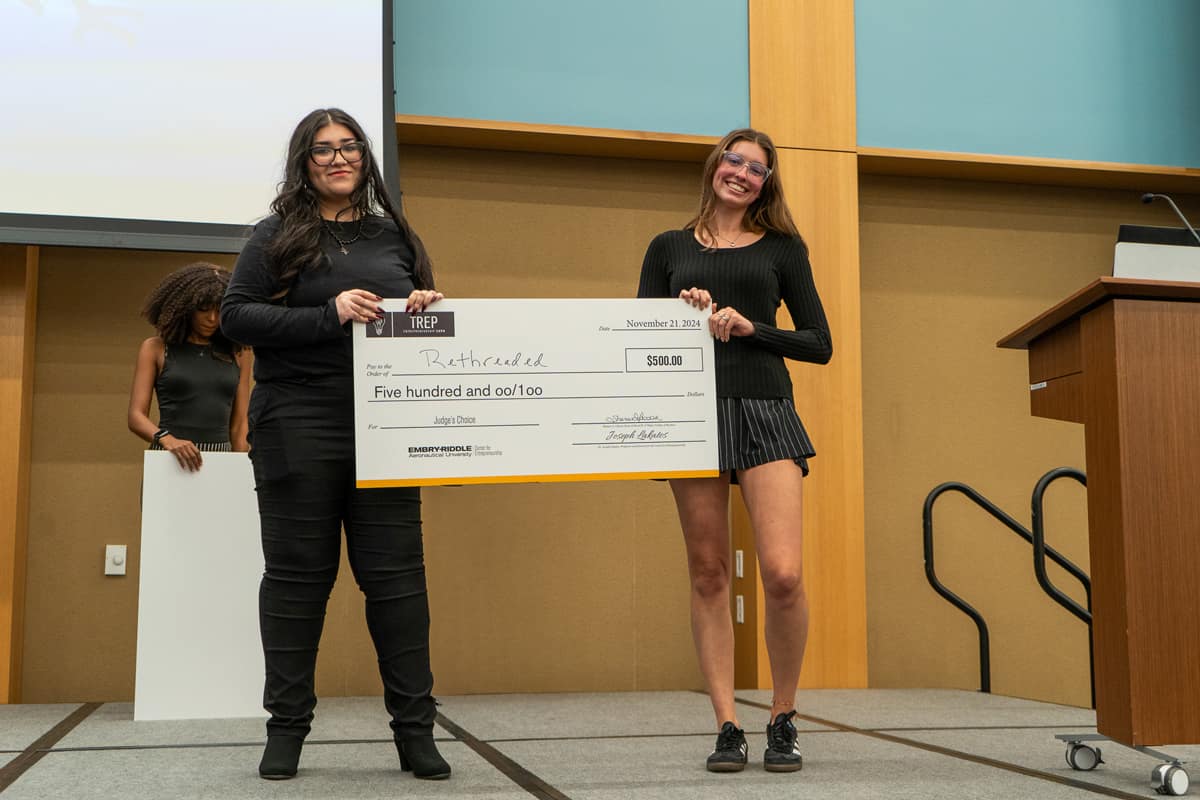
ReThreaded, represented by undergraduate student Michelle Garcia (left), won first place in the Incubation Track. (Photo: Embry‑Riddle/Ariana Grasso)
First Place in the Incubation Track: ReThreaded ($500)
ReThreaded imagines a future where circular partnerships and traceable sustainability transform the textile industry. The venture aims to take clothing donations and process them into fabric rolls that large fashion brands can reuse, ultimately reducing their environmental impact.
“When people donate their clothes, they should know where they’re going,” Communication major Samantha Garcia said.
Garcia, along with Aerospace Engineering major Audrey Dixon, Aeronautical Science major Alexander Lindsey and Aviation Business Administration student Daniel Powers, began developing ReThreaded with this transparency in mind.
The four students settled on the idea of traceable textile rolls during an entrepreneurship class, after first considering a fashion line. Ultimately, they wanted to do more, even if they were “just a four-person team.”
Garcia described the TREP Expo as “rewarding,” crediting it with helping her discover that she is “on the right track.”
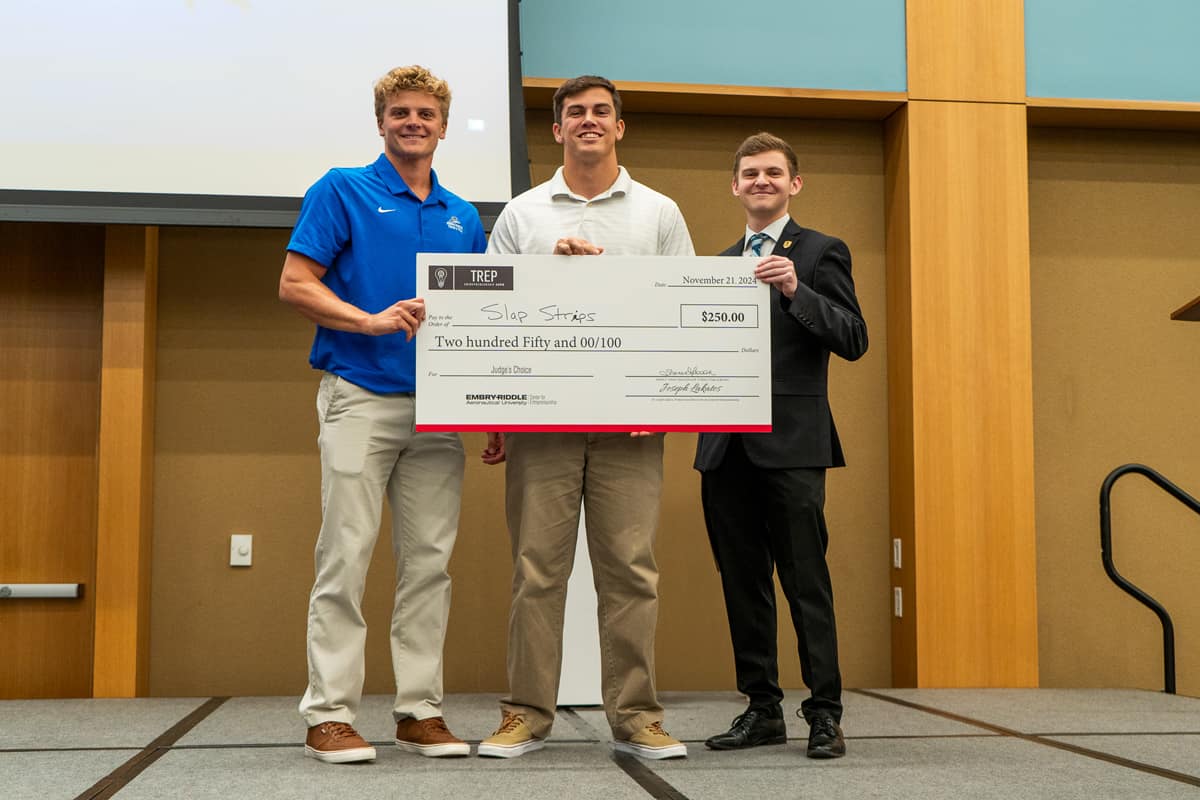
Slap Strips, represented by MBA student Ryan Flournoy (left) and undergraduate student Jacob Fleming (middle), won second place in the Incubation Track. (Photo: Embry‑Riddle/Ariana Grasso)
Second Place in the Incubation Track: Slap Strips ($250)
Energy products, whether in the form of a beverage or a stick of gum, are often riddled with additives and chemicals. Venture JRK Supplements hopes to introduce a healthier alternative to the market without sacrificing taste through its product Slap Strips.
Fleming said the idea for Slap Strips arose from his peer group’s over-reliance on traditional products. As athletes, they feared the long-term effects of such products.
Together with his best friend – MBA student Ryan Flournoy – Fleming turned to a blender and dehydrator to develop a caffeinated fruit strip from guaraná seed. The strip uses all-natural ingredients and no added sugar.
Of their second-place finish, Flournoy said, “I think the biggest thing is it’s good to know there’s traction. We came in with 75 samples and we’re leaving with none. Knowing people actually enjoy it is huge.”
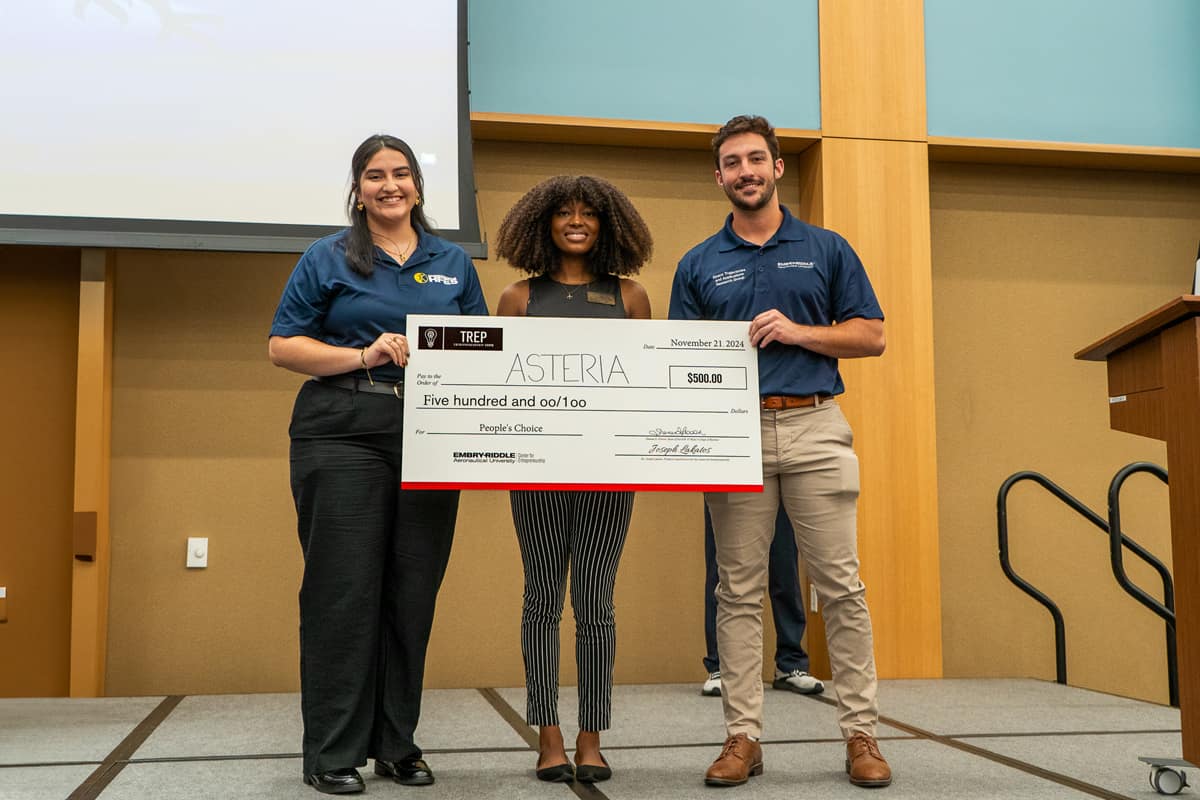
Asteria, represented by Ph.D. student Michelle Aros (left) and master’s student Joseph Anderson (right), won the People’s Choice Award. (Photo: Embry‑Riddle/Ariana Grasso)
People's Choice Award: Asteria ($500)
Each year, expo attendees are encouraged to vote for their favorite venture, an honor that this year fell to Asteria.
Asteria, which began development in Jan. 2023, offers space mission design in a more efficient and intuitive interface than traditional tools. Users can interact with 3D visualizations in a virtual environment without the need for extensive math calculations or programming skills.
“What we’re trying to solve is a lot of the tools in industry rely on expertise,” said Human Factors Ph.D. student and team co-lead Michelle Aros. “That requires a steep learning curve and months of certification,” she said.
Asteria requires neither, which Aros and co-lead Joseph Anderson believe will be enticing to small private space companies that require agility. Anderson, who is completing a master’s in Aerospace Engineering, also sees applications in education, such as undergraduate classes.
The team plans to release its first prototype in Jan. 2025.
